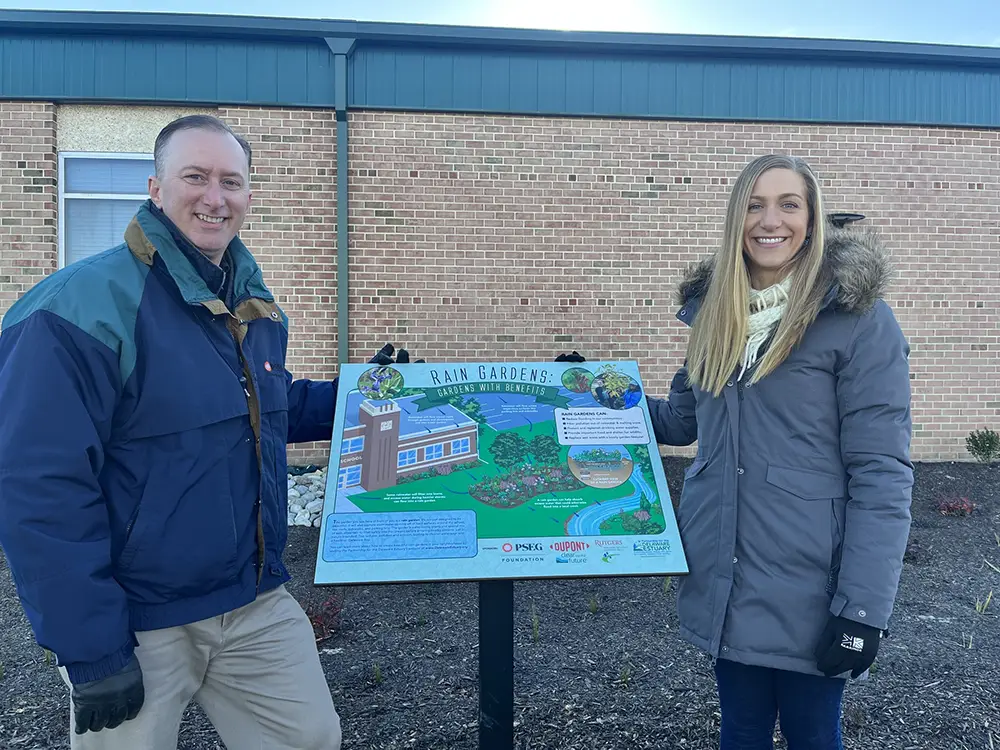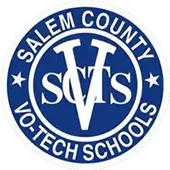Students will see the fruits of their labor when 376 native perennials and shrubs bloom in spring.
WILMINGTON — Students, faculty, and officials of Salem County Career and Technical High School (Salem County Vo-Tech) joined Partnership for the Delaware Estuary (PDE) and representatives from DuPont and PSEG on Thursday, Dec. 14, to cut the ribbon on a newly installed rain garden and sign outside the school in Woodstown, New Jersey.
With help from Agricultural Sciences teacher Keely DiTizio, PDE staff, representatives from Rutgers Cooperative Extension Water Resources Program, and Davis Lawn and Landscapes, students installed the garden in just a few days in October, working on the project during class time.
“You folks did something with the partners to beautify the school, and we’re appreciative of your hard work on the project, and it’s something that is going to stay here long after you move on to your next phase in life,” said Superintendent of Schools John R. Swain.
Rain gardens help combat flooding and also help filter pollutants from rainwater. They use water-loving native plants and shrubs to absorb excess storm water and keep it from flooding other areas. The Salem County Vo-Tech rain garden’s 397 native plants and shrubs will catch storm water as it washes off the school’s roof, keeping the lawn, parking lot, and nearby streams from flooding.
“When you think about it, one of the core components of what we teach in agricultural education is sustainability and being good caretakers of our environment,” Principal Jason Helder said. “What better way to do that than this project? Obviously, it makes our school look beautiful, but to know the environmental benefits that are not only happening here on campus but then beyond as we get out into the Delaware Bay area, it’s just awesome.”
PDE’s Engagement Director John Harrod explained that the project “is part of a larger storm water management plan that was developed for the school through this funding and with technical support from the Rutgers Cooperative Extension Water Resources Program. This rain garden is a first step, with other elements of the plan that can be implemented in the future.”
This project was made possible through grant funding from the PSEG Foundation and DuPont’s Clear into the Future program. Funding from the PSEG Foundation comes through their Neighborhood Partners Program, which has strategic pillars that include environmental sustainability, social justice, equity, and economic empowerment. DuPont’s Clear into the Future grant program provides small grants to non-government organizations that must meet specific parameters for qualification, including protecting biodiversity, contributing to climate change adaptation and mitigating the effects of climate change, advancing circular economy, and promoting water stewardship.
“I’ve worked with Keely for a couple of years now, talking to some of her students about energy choices and the environment, and realized Keely has a passion for the environment and educating her students. It just goes to show the power of networking as it started out as just a casual conversation to gauge Keely’s interest in having a rain garden installed, and the next thing you know, PDE was putting in grant applications for the rain garden through both the PSEG Foundation and DuPont. Both applications got approved, and we obviously have the rain garden to show for it now and for years to come,” said Brendan Daly, a Principal Environmental Engineer at PSEG Nuclear, located in nearby Hancock’s Bridge, NJ.
The Salem County Vo-Tech rain garden project met the guidelines for both grant programs, and was selected to receive funding support from both.
“What we really try to look for with Clear into the Future Grants is adherence to our focus areas and close connection to a local, DuPont community” said Mary Reinthal, an Associate Investigator in analytical chemistry at DuPont and Co-Chair for Clear into the Future. “We are proud to support the program because of its positive environmental impact and emphasis on volunteerism. It met everything that we wanted in a grant.”
Students from the school will continue to use this garden installation as a living classroom for years to come.
The Partnership for the Delaware Estuary, host of the Delaware Estuary Program, leads collaborative, science–based efforts to improve the Delaware River and Bay, which covers portions of Delaware, New Jersey, and Pennsylvania.



